Budget, Financial Services, Foodstuff, Latvia, Legislation, Markets and Companies
International Internet Magazine. Baltic States news & analytics
Thursday, 25.04.2024, 23:52
Health Ministry of Latvia proposes imposing excise tax on several food products
 Print version
Print version |
|---|
Budget revenue could be increased by introducing an excise tax on unhealthy food and increasing the tax rate for soft drinks, the Health Ministry's representative Oskars Sneiders told LETA. The proposal has been handed in to the Finance Ministry along with the Health Ministry's new policy initiatives.
According to the Health Ministry, excise tax could be imposed on sausages and other such meat products, meat byproducts and food made of such products, canned meat, salted, cured meat and meat byproducts with salt contents exceeding 1.8 grams per 100 grams of the product. The ministry proposes an excise tax of EUR 7 per 100 kilograms of such products.
The Health Ministry also proposes excise tax on palm oil – EUR 21 per 100 liters, lard – EUR 21 per 100 kilograms, canned soups with salt contents exceeding 1 gram per 100 grams of the product – EUR 21 per 100 kilograms.
The Health Ministry believes that excise tax could also be imposed on potato chips, salted nuts, popcorn and other salted snacks with salt content of over 1.25 grams per 100 grams of the product – also EUR 21 per 100 kilograms.
In the meantime, the Health Ministry wants the excise tax rate for sweetened soft drinks to be almost doubled. At the moment, the excise tax on soft drinks is EUR 7.4 per 100 liters, whereas the ministry suggests raising the tax rate to EUR 14.
The ministry also proposes a new excise tax rate for soft drinks containing more than 15 milligrams of caffeine per 100 milliliters, including energy drinks, to EUR 21 per 100 liters.
In order to reduce the impact of crop protection products on humans and the environment, organic farming needs to be supported so that the total amount of crop protection products is reduced or at least remains unchanged.
The Health Ministry believes that this can be achieved by increasing state duties for permits for the performance of Category A and B polluting activities, which are issued for the production or storage of crop protection products.
The Health Ministry also suggests imposing an excise tax of EUR 1 per 1 kilogram of a crop protection product.
Furthermore, the Health Ministry proposes imposing a EUR 2 excise tax per 20 milligrams of electronic cigarettes' e-liquids.
According to the ministry's estimates, if all the said measures are approved, budget revenue could increase EUR 9.5 million.
The Health Ministry's new policy initiatives, worth EUR 160 million in total, were handed in to the Finance Ministry at the beginning of June.
The initiatives are aimed at improving residents' access to healthcare – reducing patient lines and patients' payments for healthcare services, raising medical workers' salaries, further development of the state-compensated medications' scheme.
The Health Ministry's new policy initiatives will be reviewed along with other ministries' plans, taking into consideration the 2015 budget framework.








 «The Baltic Course» Is Sold and Stays in Business!
«The Baltic Course» Is Sold and Stays in Business!

